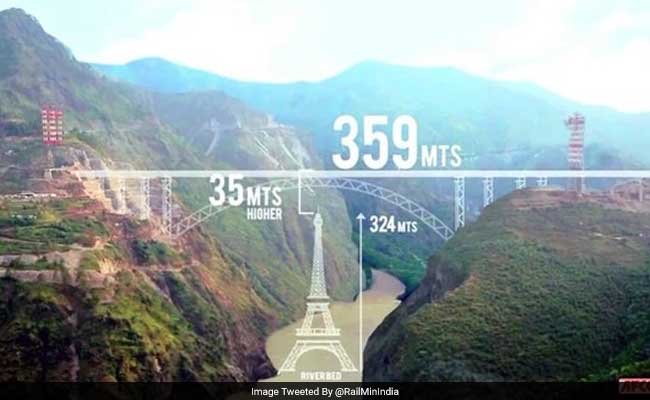
Railways has launched the main arch of the world’s highest bridge on the River Chenab in Jammu and Kashmir’s Reasi district which will provide direct connectivity to the Kashmir valley.
The iconic bridge will soar 359 metres above the bed of the River Chenab and will be 30 metres higher than the Eiffel Tower in Paris.
The bridge forms the crucial link in the 111-km stretch between Katra and Banihal which is part of the Udhampur-Srinagar-Baramulla section of the Kashmir Railway project
“We have begun the work on installations of main arch between two sides of the bridge. We have launched the main-arch”, MK Gupta, Member Engineering, Railway Board told reporters Kauri, Reasi district yesterday.
“The iconic bridge is being constructed on River Chenab on the Katra-Banihal section as part of the flagship Udhampur-Srinagar-Baramulla Rail Link (USBRL) Project,” Mr Gupta said.
The launch of the main arch is a noteworthy endeavour as it entails carrying heavy segments from two ends of the bridge – Kauri end and Bakkal end – and involves the world longest cable crane arrangement.
The 1.3-km-long bridge is being constructed at a cost of Rs. 1,250 crore. “It is part of a big project. The work is being done by AFCONS through Konkan railways. We will complete it by May 2019”, Mr Gupta said.
“The work has been launched simultaneously from both the sides. The design of the bridge has been made to sustain earthquake of magnitude 8 on the Richter scale”, he said.
National and international consultants have been engaged during various stages of the project. Detailed geo-physical studies, seismic studies and slope stability studies have been included.
The erection of the bridge is a project in itself. To achieve these pylons were erected on either side of the river, and two auxiliary self-propelled cable cranes were used to tow temporary auxiliary ropes across these pylons, they said.
“The ropes were used to support the partly finished arch parts. Both the embankments of Chenab facing downstream have hard cherty dolomite and quartzite forming steep cliffs”, a top engineer said.
The launch is typically performed in a series of increments so that additional sections can be added to the rear of the superstructure unit prior to subsequent launches, he said.
Mr Gupta said that three massive workshops for undertaking fabrication of steel structure has been commissioned at Srinagar end of bridge and one at Katra end of the bridge.
“For launching purpose, arrangements in the form of pylons with cable cranes spanning the entire gorge have been completed successfully. The cable crane assembly including pylons at span of 915 meters is the longest in the world. For the first time a Railways viaduct was launched on curve of 2.74 degree”, he said.
The officials said that more than 1,300 workers and 300 engineers have been working round-the-clock to complete the bridge by May 2019.
The construction started in 2004, but the work was stopped in 2008-09 on the aspect of safety of rail passengers due to frequent high velocity winds in the area.
The officials said that it was finally decided to stop train operations when the wind velocity touches 90 kmh with the help of the automatic signalling system and anemometer (instrument to measure the velocity of winds).
He said the bridge under construction can withstand winds up to 260 kmph and its lifespan will be 120 years.
On the other side of the Chenab river, the Railways is constructing three big tunnels of various lengths T2 (5.9 KM), T3 (9.37 km) and T14 (13 km).
